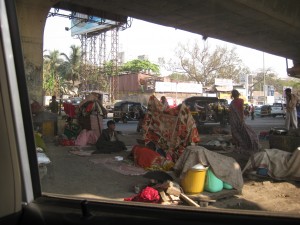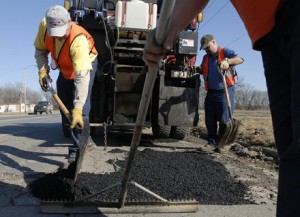Trimalchio, the ex-slave turned millionaire in Petronius’s Satyricon, invested all his money is some ships so that he could transport his wine to sell it in Rome, a short distance away. Sea transport was a risky business, though, and his little fleet was wrecked and he lost it all.  Why didn’t he ship it by land? Because the roads of ancient Rome were there for the army, not for business or personal travel, and transport by road would have been very slow, expensive and difficult.
Why didn’t he ship it by land? Because the roads of ancient Rome were there for the army, not for business or personal travel, and transport by road would have been very slow, expensive and difficult.
This little scenario is interesting because it invites us to think about roads–about their importance and about their nature. We rely upon roads daily, directly for our personal travel but also indirectly for making available to us all the goods and services that have to be transported to our nearby spots. Historically, the “silk road,” the central route connecting traders and travellers from ancient China to ancient India, Persia, Palestine and Egypt, was a central force in facilitating development both between and within these cultures. It is precisely the importance of these routes that makes them also prime sites for power: control of these access-routes allows one to control the flows of goods, people, and ideas, a control that can be directed towards cultural development or can be used for all sorts of military and economic exploitation. And, of course, roads should not simply be thought of as land routes: the sea route Trimalchio’s ships sailed similarly functioned as a road as do all sorts of contemporary air and sea routes. What is it that makes a road? I notice two features in particular that seem to definitive of roads.
First, roads are not a destination, but a route. Of course on can settle on a piece of highway and play a game, start a business,or make a home (the plight, often, of the poor and disenfranchised), but to do this is not to treat it as a road.  Roads are “made out of” asphalt or gravel, to be sure, but more importantly they are “made out of” an attitude we take to them, namely, the attitude that this piece of the world is for travelling. Further, this is a collective decision: we must all recognize and respect that this is a road if it is to be able to function well.
Roads are “made out of” asphalt or gravel, to be sure, but more importantly they are “made out of” an attitude we take to them, namely, the attitude that this piece of the world is for travelling. Further, this is a collective decision: we must all recognize and respect that this is a road if it is to be able to function well.
This notion of collective recognition points to the second definitive feature of roads. A road is not just my thing for going to my place, but is something any of us could use to go wherever each of us should desire. The road itself, qua road, is indifferent to user, direction, and destination. As Heraclitus writes, “the road out and the road back are the same.”
To use a road, then, is to enter into a shared perception of the character of (a piece of) the world, and it is essentially an agreement to enter into a space that others are entitled to enter with equal legitimacy and with conflicting goals. It is the very nature of the road that using it for my own purpose simultaneously and automatically puts me into negotiation with the opposed purposes of others, and it is incumbent upon me (and them) to act cooperatively so as to coordinate our conflicting projects.
I have two points I want to make about these reflections on roads.
1. We generally take roads for granted. We don’t typically notice a shift in our attitude when we change from “inhabiting” a place (while chatting in a coffee shop or working in the office) to “travelling through” space. That change in activity does involve a fundamental change in our “interpretation” of the nature of our surroundings, however: our surrounding world is not longer a destination or “end,” but a route, a “means.” We expect the world to accommodate this change and, typically, it does, with the result that we needn’t pay much heed to the issue. In fact, though, the viability of the world as a place for travel must be accomplished and maintained. Most immediately, we can travel so easily only because we have a history of governments who have established and maintained the “infrastructure” of roads and the traffic laws that govern their use.  Even more basically, though, we rely upon the cooperation of others to treat this as a space in which we can move freely. We no longer face the danger of moving across land that was faced, for example, by Ibn Fadlan, Marco Polo, or St. Paul as they embarked on their travels. They knew that crossing the land was a matter of engaging with people, and they behaved (and suffered) accordingly. We however can easily fail to notice that inhabiting space is always also a matter of inhabiting society, that our own “personal” movements are a matter of interpersonal negotiation. The very success of our society in providing us with reliable access to interpersonal space has concealed from us the essentially intersubjective nature of space.
Even more basically, though, we rely upon the cooperation of others to treat this as a space in which we can move freely. We no longer face the danger of moving across land that was faced, for example, by Ibn Fadlan, Marco Polo, or St. Paul as they embarked on their travels. They knew that crossing the land was a matter of engaging with people, and they behaved (and suffered) accordingly. We however can easily fail to notice that inhabiting space is always also a matter of inhabiting society, that our own “personal” movements are a matter of interpersonal negotiation. The very success of our society in providing us with reliable access to interpersonal space has concealed from us the essentially intersubjective nature of space.
2. We need to remember, too, that roads are not a destination: roads are themselves only important if we have somewhere to go to. Our society has been very successful in establishing for us an environment in which we can travel; we have established, in other words, a social environment that treats space as an “indifferent” space. We must remember, however, that, as well as travelling in generic space, we must also be able to inhabit specific places. We need, that is, to be able to make homes for ourselves in places that are not indifferent, but that are our own, that are “for” us. Without such places, we have no destinations. My last point was that our society’s success in establishing a world of “equal rights” has the paradoxical effect of concealing our dependence upon society; I want to suggest now that our political goal of establishing the indifferent equality of all–a goal of universal inclusion–similarly conceals the essentially exclusive use of places that we all ultimately depend upon, and that is the very reason why we need roads, the very reason we need an indifferent space.
We must not confuse a road with asphalt–for it is a social negotiation–and we must not confuse it with a destination–for it is only a route. A world with an asphalt route, but no social cooperation and no destinations would be a wasteland, and a world in which that asphalt route would be, precisely, useless. This, indeed, is the exact situation dramatized by Cormac McCarthy in The Road, which portrays a world in which there is a road, but no longer a society, no longer a goal. McCarthy’s novel reveals, it seems to me, the disastrous implications of a politics that conceals the essential role of government, and substitutes the norm of instrumentality for the norm of healthy social life. We should be concerned, I think, that this might be an image of precisely the implications of our own political world of technological instrumentalism, individualist democracy and global capitalism.


 Participants in these
seminars consistently have the experience of growth in their conversation and
conceptual abilities, and typically leave with a transformed sense of the nature
and possibilities of philosophy.
Participants in these
seminars consistently have the experience of growth in their conversation and
conceptual abilities, and typically leave with a transformed sense of the nature
and possibilities of philosophy.





6 Comments
I like these thoughts. I’ve been thinking about transportation routes recently too, but more railroads and bridges. What is interesting about these, and you touch on this theme here, is the way they can play a dominant role in mainstream society, but then can also play alternative roles for others. Here you have the example of the road which is by definition not a destination for mainstream users, but then may be a place to live for the homeless. In the case of bridges and railroad tracks, as well as roads, they can at one the one hand be the taken-for-granted throughway, the “indifferent space,” for mainstream users. And yet for others can be just the opposite: an explicit barrier. Train tracks can separate neighborhoods. Bridges without walkways can provide an obstacle for those without cars. Here in Atlanta, a gigantic multi-lane highway splits the city in two…
Your point about Atlanta strongly reminds of an experience of my own. I grew up in Regina, Saskatchewan where, at a certain time, it was decided to build the “Lewvan Expressway.” This was a multi-lane, higher speed, north-south route, that allowed people to travel quickly from downtown to their suburban homes or to travel quickly from downtown homes to the big malls at the edges of town, without their having to drive through the existing city streets. To ensure that people took this “expressway,” the city actually redesigned the city streets that formerly provided north-south access, supposedly to facilitate a more traffic-free life for those neighbourhoods. In fact, the neighbourhoods thus removed from people’s regular travel routes were the neighbourhoods that disproportionately housed lower income, First Nations residents. What the Lewvan Expressway effectively did was use roadways to build a wall around that neighbourhood, isolating it from easy access to the rest of the city, and removing it from the view of those who did not live there. Since the building of “the Lewvan,” that area has progressively and dramatically become a ghetto.
I am interested currently, too, in the way that there is something “destination-like” about certain ways of being on a road. I’ve heard this quote attributed to the Buddha many times during yoga classes, for instance: “There is no path to happiness: happiness is the path.” Similarly, I have wondered about pilgrimages: Is it the destination that is important, or is it the being-on-the-way. There’s something so significant about the experience the road allows us of being suspended, of not being settled or certain, or there yet. True, without some aim or destination of a sort, this suspension may become meaningless, but I’m intrigued by the openness that the road allows that a place might lack if traveling were not required. How much, in other words, is a destination also equally defined by the road?
Interesting. I would like to know whether a) you mean “route” more than “road” and b) whether “route” means “road”? must be an etymological connection i’m sure…
makes me also think of how this is “normally” what a road is. and how that feature gets produced in experience, what its conditions of possibility are. it’s interesting how, on both robert’s and your examples, a freeway, e.g., presents itself as the exemplary road. this is acuter in developing countries, where the state not only makes the road (as this showed up in the political dimension of your post), but its entire existence consists in spectacles of building roads (because a developing nation is, well, developing, and its state actions are glorifying development for the greater part). makes me think a lot about how we came to have this normal experience of a road amidst all these crisscrossing paths…
I keep thinking about the point that we don’t always recognize we are on roads. This is both true of ostensible roads, like highways, but also in less obvious cases. A few years ago I took a day hike through the backwoods of Northern Ontario with my friend Andrew. We were remarking to ourselves how pleasant it was to have the woods to ourselves. We were following a marked trail, but for awhile we lost sight of trail markers and decided to pursue a path that would logically take us in the direction we needed to go. Far away from any settled, civilized area, we were surprised to see a few artifacts, signs of human inhabitation. We continued on without thinking much of them, until we noticed a structure that we surmised might have been a human dwelling. As we passed by the place, it was pretty clear to us that we were in fact using some kind of road, a pathway from this ramshackle home to a nearby river. We arrived at the river, but found no way across—the road was a dead-end. Just then, coincidentally, an old man with a few dogs came and accosted us, asked us what we were doing there. Once it was clear to him that we were just passing through, that we were no threat, he explained that we could go off-road for awhile and find a beaver dam that would allow us to ford the river. It is interesting to think of how that seemingly abandoned way through the woods was in fact a road, a protected space that required the confirmation of an other person to travel through. I remember seeing old Roman roads in Portugal, still intact paths of leveled-earth, but unused. I remember thinking about how well-maintained those roads were. In fact, they weren’t really roads, since no one seemed to be using them. On the other hand, this scant little berry-trail turned out to be a road.
A couple of weeks ago I was stopped in Montreal by the police at night for going through some red lights on my bicycle. The roads were empty, and I started to explain to the officer that if the roads were empty, I could travel as I wished—I was treating the road as if it was mine. I caught myself, realizing that aside from being stupid to argue with a cop, I was asserting something absurd about the nature of the road. The road is a space of rules, rules that don’t change between busy rush hour and quiet nighttime. My mood quickly changed from frustration to understanding: I realized that these weren’t just cops accosting me and giving me a hard time, but agents of the road, there to legitimate and protect its purpose. I told the officer that I knew better, that I respect the law and should have respected the “rules of the road.” Ironically, he said to me: “It is not about the law, but about you and me. If you shit on me: I shit on you. You’re not shitting on me, you’re a good guy: so, it is going to be okay.” That is the way of the road, I guess, that even if we don’t explicitly understand it, it functions as a space of mutual use and legal protection.
Your post is helping me understand these little stories, because even when seemingly empty or non-roads, roads are spaces that announce themselves by signs that they belong to others, whether stop lights and navigational symbols, or implicit signs that a space is a road. I think too, that crossing international borders, especially land-borders, is a moment when the road is made explicit as road, because like these other situations this is a time when we have to justify our use of the road.
“Agents of the road”–I like that.